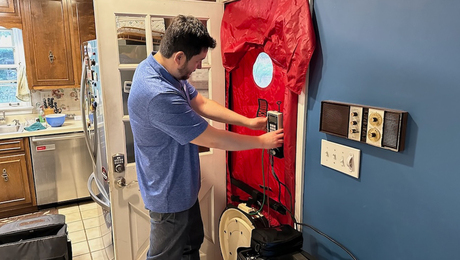okay in general Ive allways been bad about organization, but im trying my hand at being self employed and realizing that I cant survive without keeping better financial track of what is happening.
Im young, doing small jobs.. It is not my intention to make a career out of what Im doing right now (carpentry maybe, but self employment, probably not) Still i neet some way to keep track of very simple things such as money coming in, money going out, and hours worked on a given project.
I usually work hourly because I dont have a liscense.
currently my only orginizational tool is a contractors clipboard, inside i have a mess of reciepts and paper which i have notes about projects with hours scribbled in an unorganized fasion.
Also I only have my personal checking account.
I plan on getting a secont checking account which will be strictly for buisness. Also I plan on printing out some simple spreadsheets, one for each client, I will staple theese to envelops to keep reciepts and on the spreadsheets I will keep track of hours that Ive worked, dates that money comes in, and dates that money goes out.
At the end of the week I’ll input the info to MS excel on mky comp.
What I need help with is how to organize that so that at a glance I’ll know exzactly where Im at financially with each client.
The most important thing for me is that its easy and simple to put in and extract info, Im a procrastinator with paper work so i need somthing simple and easy.
What works for you? any suggestions of things to keep track of besides what Ive mentioned? any better ideas of how to keep track of the things Ive mentioned?
Thanks for your time.
______________________________________________
–> measure once / scribble several lines / spend some time figuring out wich scribble / cut the wrong line / get mad



















Replies
currently my only orginizational tool is a contractors clipboard
I used one of those for a while. Then I realized that what I really needed was a three ring binder, with dividers for specific sections.
One section includes pages of week-at-a-glance calendar pages. I print these off of my computer using Microsoft Works (the freebie with just about any 'puter). I log my hours to each project on htese pages, using pen or pencil at the end of each day. I also use these pages to plan ahead. Note that planning ahead, and logging hours, are done in different colors to avoid confusion.
The next section includes a page or two (no more) for each of the projects that are "booked business". Each of those pages is hand written on normal notebook paper, and includes the basics -- customer name and address, brief description of the project, agreed price, and directions to the jobsite. These pages, in concert with the calendar pages, tell me how far ahead (or behind) I am booked.
The next section includes pocket folders. One for each of the projects that is currently active. As I make purchases or other committments for a project, the receipts and notes and contracts go in the pocket folder for that project. As a project nears completion, all of the receipts are readily available for the purpose of accounting and invoicing.
The last section is sort of a "tickler" file. Any calls that I get, any sales calls, any visits to a customer, are logged on their own page. Note that these pages are simply moved to the "booked business" section if/when I am informed that I got the job. The information here includes dates, names/contact info, as well as job data and relevant measurements, projected customer budget (if known), and other customer comments (timeline, tastes, personality notes.....)
That last section also includes a few dozen sheets of blank notebook paper and blank graph paper -- really handy stuff when the cell phone rings and you find yourself at a look-see in the middle of a day.
Stuffed into the pockets inside the front and back covers, I have my pre-printed formstock for giving simple-job quotes, as well as simple-job invoices.
Oh, and somewhere in there I have a couple of pages with contact information for most of my suppliers and the few subs that I deal with.
Unless you're the lead dog, the view just never changes.
"
I plan on getting a secont checking account which will be strictly for buisness. Also I plan on printing out some simple spreadsheets, one for each client, I will staple theese to envelops to keep reciepts and on the spreadsheets I will keep track of hours that Ive worked, dates that money comes in, and dates that money goes out.
At the end of the week I'll input the info to MS excel on mky comp.
What I need help with is how to organize that so that at a glance I'll know exzactly where Im at financially with each client."
I'd have a file folder or small binder for each client. You can carry around a paper copy or just make it a point to update your computer spread sheets each evening. I don't actually bother to make separate spread sheets for each client, I just have an excel spread sheet for each year I do income on one and expenses on the other. The income one is simple for expenses, I have a column with date, amount received, miles traveled, what I did, which client or whether it's an office expense, which tax category it will be (I usually don't bother to fill that one out till April). When I sit down to do billing I sort the list by client. The rest of the time I just have it sorted by date.
yellow legal pad
pen
calculator.
Just write it all down ...
Money in ... money out ... starting and ending balance.
Jeff
You might want to consider one of the Quicken products. Not the full blown contractor one, but the home and business one is pretty reasonable.
Yes. Definately a simple business accounting package.It has to be the business one so that it can do invoices and track receivables and inventory and stuff. To start, you don't want anything really complicated.One word of advice when you start doing by the job. Invoice promptly and pay attention to your receivables. Lots of people do a bad job of this...If my house wasn't a 100 years old... there would go a really fine hobby.
what are recievables?______________________________________________
--> measure once / scribble several lines / spend some time figuring out wich scribble / cut the wrong line / get mad
Receivables - stuff that you have billed for, but not received payment for.
First of all, 90% of my business is small jobs that are done in a day or two.I keep a three ring binder. In the first section I record my mileage. I do this because I own the van and the corporation pays me mileage. While I'm recording the mileage, I note arrival and departure times as well as where I am. This takes very little time and gives a decent record of the day.The next section is the phone log. Any (business) phone call received or made is entered here.The third section is a list of jobs that I need to do. This includes jobs that I have been hired to do as well as tasks such as putting together a bid, checking on material, whatever. I review this list to plan tomorrow.Any receipts go in to the pocker on the binder cover.Usually every day (I've been known to let this go but I've always regretted it), at the end of the day, the receipts (and deposits and checks written) are entered into the computer spreadsheets (actually a double entry accounting system that I created in Quatro Pro), numbered and filed into an envelope.Rich BeckmanAnother day, another tool.
Hey, look on the bright side. I just found out the hard way that what you have in place right now is worlds more sophisticated and organized than what my business partner has been doing for the past year!
I'm screwed and am preparing to bail out before it's bankruptcy time. At least you recognize that an accounting system is essential. My partner actually said to me whan I confronted him about this... "I don't have time to be playing around tapping on a computer! I have a business to run!" I'm not kidding! he actually said that.
I think that the 3 ring binder and simple accounting program suggestions are good ones. But if you are a procrastinator like me the most important thing you can do is to force yourself to actually set aside a specific time each day to sit down and enter the pertinant info. It's too easy for me to just say, "I'll do it tomorrow". Pretty soon you're 4 or 5 tomorrows down the line and the next thing you know, You're trying to remember stuff from last week sometime.
Another thing that I do is keep a spiral notebook (just like what you used in school) and keep a "diary" of what I do every day. This has become an invaluable resource when a question arises about something that happened 3 months ago. Not to mention after a while it will help you in predicting how long it should take to do certain jobs for bidding and estimating purposes.
Anyway, good luck! And whatever you do, don't get involved with a "partner" if you can at all avoid it.
Im sorry about your troubles with your partner, at least you'll have some memorable quotes to leaugh at once its all behind you.I like the idea of the "work diary". I said that I do hourly because i dont have a liscense, but i dont want to invest in one untill i feel comfortable bidding a job in such a way that Im certain not to loose $$ on it. Anyway i think your idea is perfect for me because I can compile that info once a job is compleated and learn better how to judge my time .______________________________________________
--> measure once / scribble several lines / spend some time figuring out wich scribble / cut the wrong line / get mad